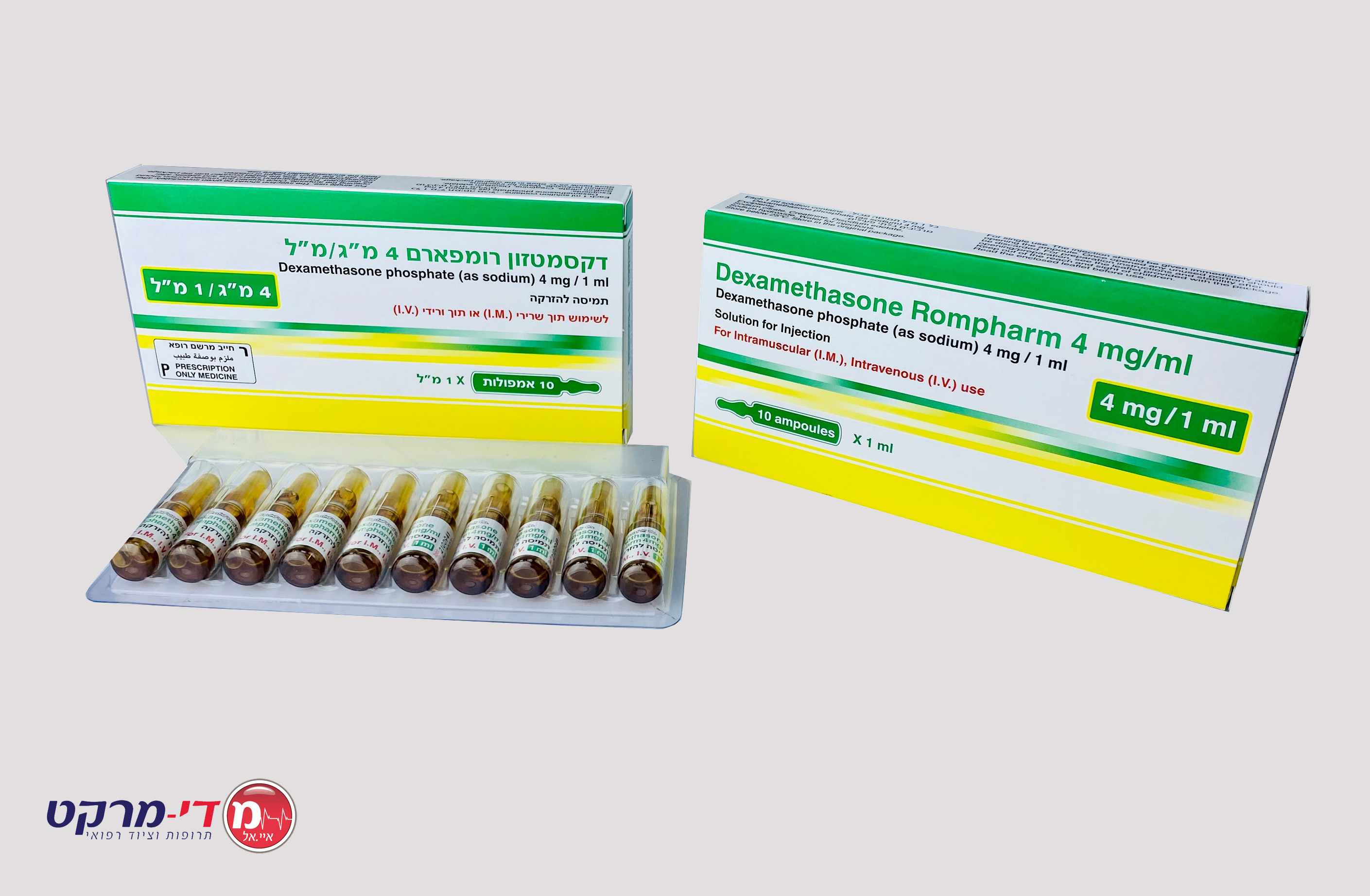Quest for the right Drug

דקסמטזון רומפארם 4 מ"ג/מ"ל DEXAMETHASONE ROMPHARM 4 MG/ML (DEXAMETHASONE PHOSPHATE (AS SODIUM))
תרופה במרשם
תרופה בסל
נרקוטיקה
ציטוטוקסיקה
צורת מתן:
תוך-שרירי, תוך-ורידי : I.M, I.V
צורת מינון:
תמיסה להזרקהאינפוזיה : SOLUTION FOR INJECTION / INFUSION
עלון לרופא
מינוניםPosology התוויות
Indications תופעות לוואי
Adverse reactions התוויות נגד
Contraindications אינטראקציות
Interactions מינון יתר
Overdose הריון/הנקה
Pregnancy & Lactation אוכלוסיות מיוחדות
Special populations תכונות פרמקולוגיות
Pharmacological properties מידע רוקחי
Pharmaceutical particulars אזהרת שימוש
Special Warning עלון לרופא
Physicians Leaflet
Interactions : אינטראקציות
4.5. Interaction with other medicinal products and other forms of interaction Phenytoin, phenobarbital, adrenaline and rifampicin can increase the metabolic clearance of corticosteroids, causing a decrease in their blood levels and a decrease in their pharmacological activity, requiring an adjustment of the corticosteroid dose. These interactions can interfere with the dexamethasone suppression test, so the results obtained in these situations must be interpreted carefully during the administration of these drugs. Dexamethasone can increase plasma levels of albendazole with possible inhibition of its effect, by inducing its hepatic metabolism. Ephedrine may decrease plasma levels of dexamethasone, with possible loss of asthma control. False negatives in the dexamethasone suppression test have been reported in patients who were treated with indomethacin; these results should be interpreted with caution. Due to its hypoprothrombin activity, acetylsalicylic acid should be used with caution during treatment with corticosteroids. Prothrombin time should be checked frequently in patients receiving coumarin anticoagulants or indandione derivatives together with corticosteroids, since the latter alter the response of anticoagulants. Different studies have shown that they normally inhibit the response to coumarins, although there are some studies in which potentiation occurs. When corticosteroids are administered concomitantly with potassium-depleting diuretics, patients should be examined frequently to avoid the development of hypokalaemia. Glucocorticoids can increase blood glucose concentration; it may be necessary to adjust the dosage of oral hypoglycemic agents or insulin or glucocorticoid when co-administered with any of these drugs. Dexamethasone reduces the effects of antidiabetic drugs and potentiates the hypokalaemia of different diuretics and cardiotonic glycosides. The action of the corticosteroid is increased if combined with estrogens and decreased if used with aminoglutethimide, carbamazepine, phenytoin or rifampin. With indomethacin there is mutual potentiation of toxicity and with isoniazid a reduction in plasma levels of the latter. Concomitant treatment with CYP3A inhibitors, including medicinal products containing cobicistat-, is expected to increase the risk of systemic adverse reactions. This combination should be avoided unless the benefit outweighs the increased risk of corticosteroid-related systemic adverse reactions, in which case patients should be followed for systemic corticosteroid reactions. This medicine can alter the values in: - Blood: increased cholesterol and glucose and decreased calcium, potassium and thyroid hormones. - Urine: increased glucose. - Skin tests: tuberculin and allergy patch tests.

שימוש לפי פנקס קופ''ח כללית 1994
Acute adrenal insufficiency, status asthmaticus, shock (anaphylactic, septic), adult respiratory distress syndrome, cerebral edema
תאריך הכללה מקורי בסל
01/01/1995
הגבלות
תרופה שאושרה לשימוש כללי בקופ'ח
מידע נוסף
